Key takeaways:
- Pro-life advocacy emphasizes the sanctity of human life and supports mothers and children through education and resources.
- Local events foster community engagement, amplify unheard voices, and create connections through shared stories.
- Effective event planning requires clear goals, the right venue, personal outreach, and follow-up to maintain relationships.
- Overcoming challenges in event organization highlights the importance of adaptability, clear communication, and emotional connection with attendees.
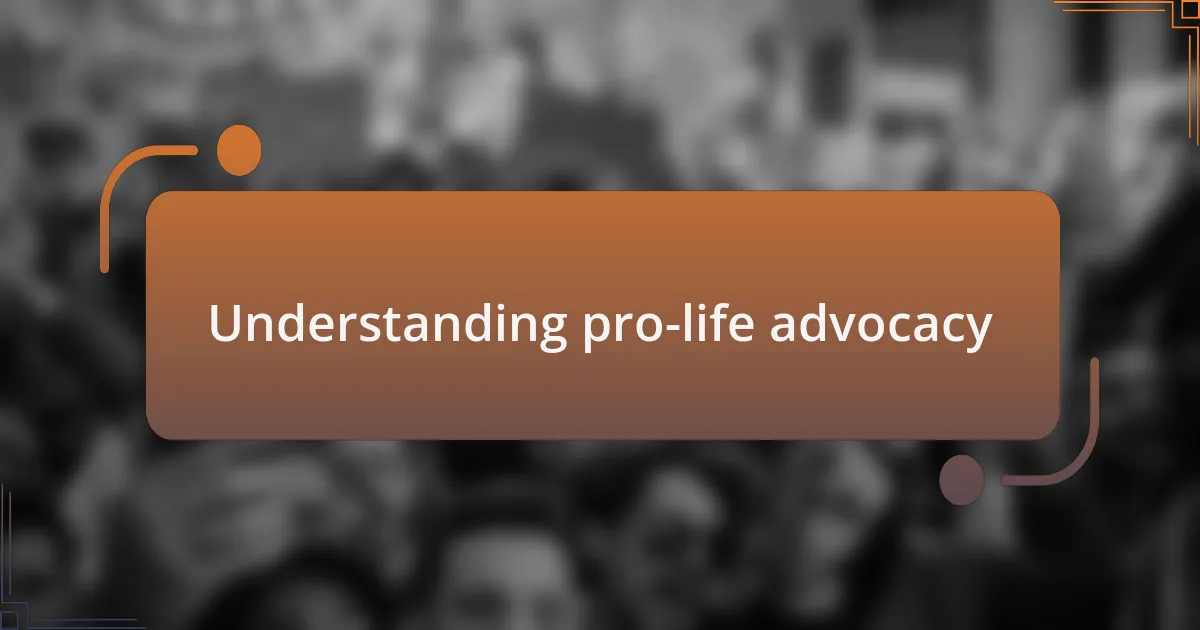
Understanding pro-life advocacy
Pro-life advocacy centers around the belief in the sanctity of human life from conception to natural death. In my experience, this conviction isn’t just a philosophical stance; it’s deeply rooted in personal stories and real-life experiences. Have you ever heard a mother share her joy after choosing life? Those moments are powerful reminders of why we fight for this cause.
As I’ve engaged with various communities, I’ve found that pro-life advocacy isn’t just about opposing abortion; it’s about supporting both mothers and their children through education, resources, and compassion. I remember a woman who, despite facing immense pressure to terminate her pregnancy, chose instead to embrace the challenges of motherhood. Her courage reinforced my belief that with the right support, women can choose life even in the most trying circumstances.
Understanding pro-life advocacy also involves recognizing the social and emotional dimensions of this issue. I often reflect on the empathy needed when discussing such a sensitive topic. How do we share our message without alienating those who might disagree? In my experience, approaching conversations with kindness and understanding opens the door for dialogue rather than debates.
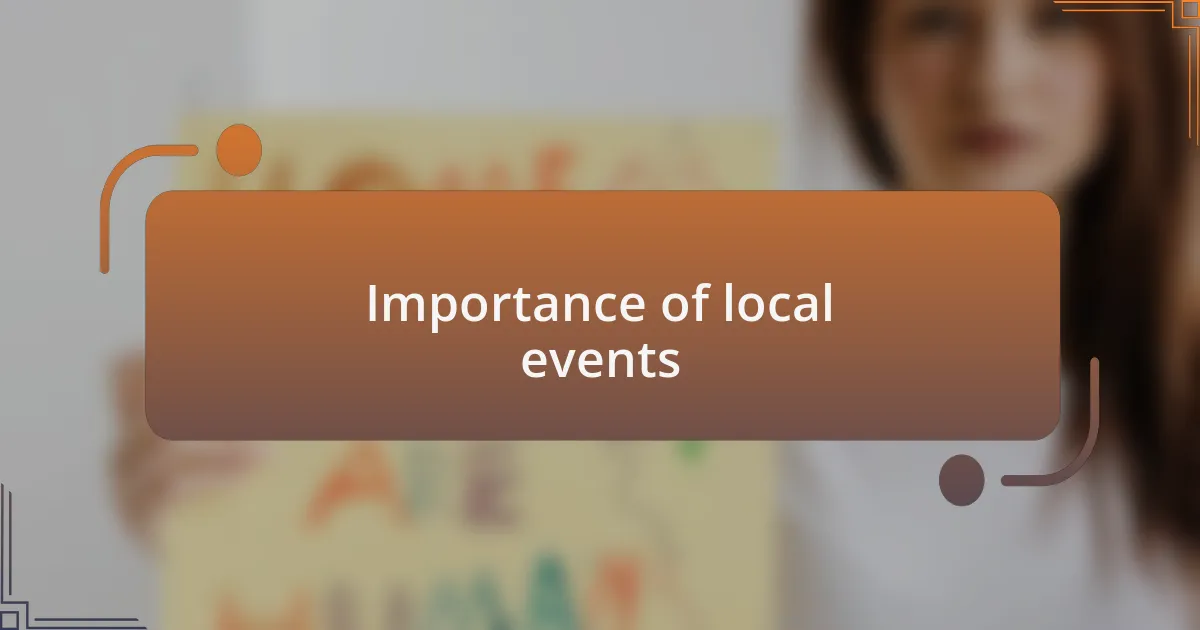
Importance of local events
Local events play a vital role in fostering community connections and raising awareness about pro-life issues. I recall organizing a local fundraiser where attendees shared heartfelt stories of hope and survival. Those personal testimonies drew people together, affirming that every life has value and deserves recognition.
Moreover, these gatherings create a platform for education. At one community forum, I witnessed how sharing information about available resources empowered attendees to make informed choices. It was incredible to see how the dialogue shifted toward compassion, igniting a shared commitment to supporting mothers and children alike.
The power of local events lies in their ability to amplify voices that might otherwise go unheard. When I hosted a discussion panel, I saw individuals who had previously felt isolated join the conversation with enthusiasm. Their willingness to share personal experiences ignited a sense of solidarity that wasn’t just inspiring; it was transformative for our community. How often do we truly listen to those stories in our busy lives?
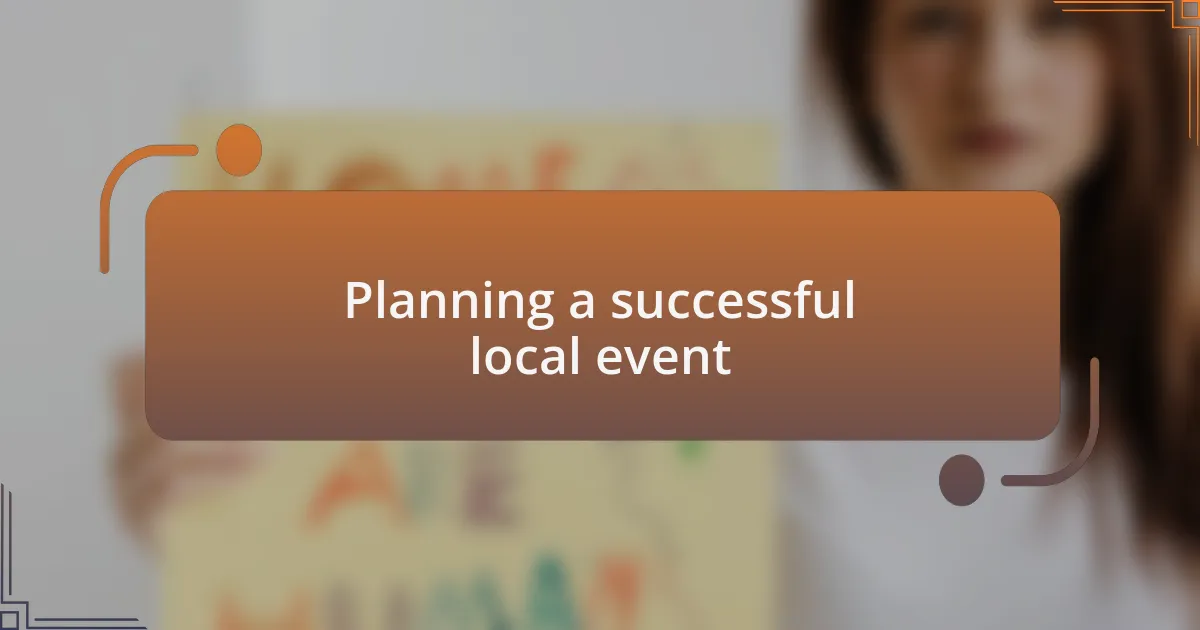
Planning a successful local event
When planning a successful local event, it’s crucial to establish clear goals from the outset. During one event I organized, our aim was to not only raise funds but also to strengthen community ties. This focus helped us create activities and discussions that resonated with attendees, making the event memorable and impactful. How do you define success for your gatherings?
Choosing the right venue can make or break an event. I remember standing in a small park before our anniversary celebration, feeling nervous about the space’s capacity. However, the intimate setting allowed for genuine interactions, and people lingered longer to connect. The atmosphere helped foster a closeness that wouldn’t have been possible in a larger, more formal location.
Promotion is another vital component in event planning. I learned firsthand that personal outreach often yields better results than blanket advertising. When I personally invited friends and community members, they felt valued and were more likely to attend and bring others. How do we create that sense of ownership and responsibility to show up for one another?
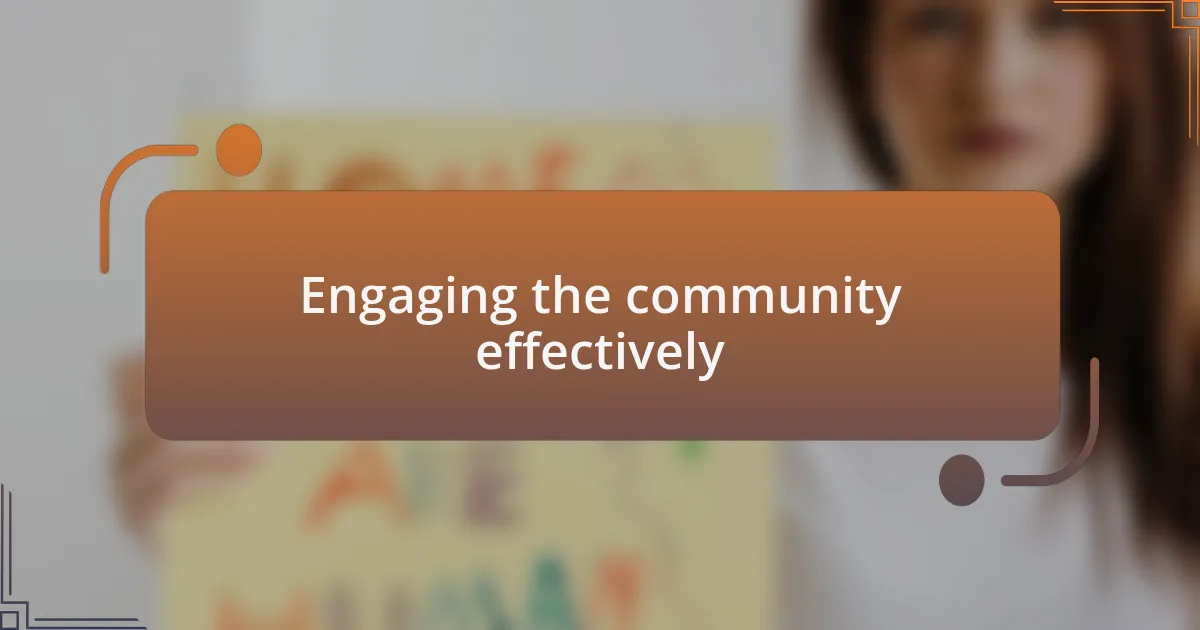
Engaging the community effectively
Engaging the community effectively is about fostering a sense of belonging among attendees. I remember one event where we invited local leaders to share their stories. The genuine conversations that emerged not only inspired attendees but created a bond that made everyone feel part of something greater. What if we could create a community where everyone feels their voice matters?
Another key aspect is involving participants in the planning process. During our last event, we created a survey to gather ideas from the community. I was surprised by the creativity and enthusiasm that flowed from tapping into their passions. This not only ensured activities were relevant but also increased engagement as they felt personally invested. How often do we miss the opportunity to listen to those around us?
Lastly, follow-up is crucial for maintaining the enthusiasm generated during the event. After our gathering, I took the time to send thank-you notes and share memories from the day, reinforcing connections. It’s amazing how a simple gesture like this can transform a fleeting interaction into lasting relationships. Isn’t it worthwhile to invest that extra effort?
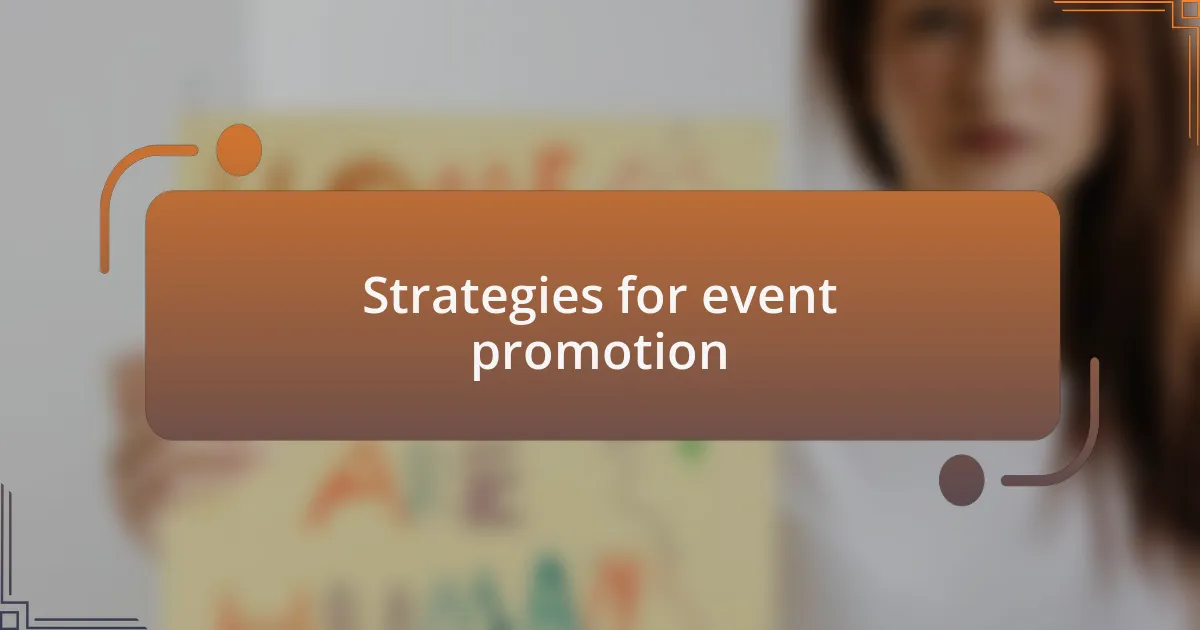
Strategies for event promotion
When it comes to promoting an event, leveraging social media is a game-changer. I remember sharing a post on our local Facebook group that sparked a flurry of comments and shares. The excitement in the community grew rapidly, and it was clear that people loved feeling connected and informed. How can we harness that same energy to drive participation?
Another effective strategy is collaboration with local businesses. For our last event, we partnered with a nearby coffee shop that offered discounts to attendees. We created a win-win situation where the shop drew in more customers, and we gained a venue buzzing with activity. Isn’t it fascinating how community support can amplify our efforts in unexpected ways?
Lastly, utilizing email marketing can be incredibly effective for keeping attendees informed and engaged. I find that sending out a series of countdown emails not only builds anticipation but also reaffirms that their participation is valued. It’s a simple yet powerful reminder—as event organizers, how often do we truly celebrate our attendees’ commitment?
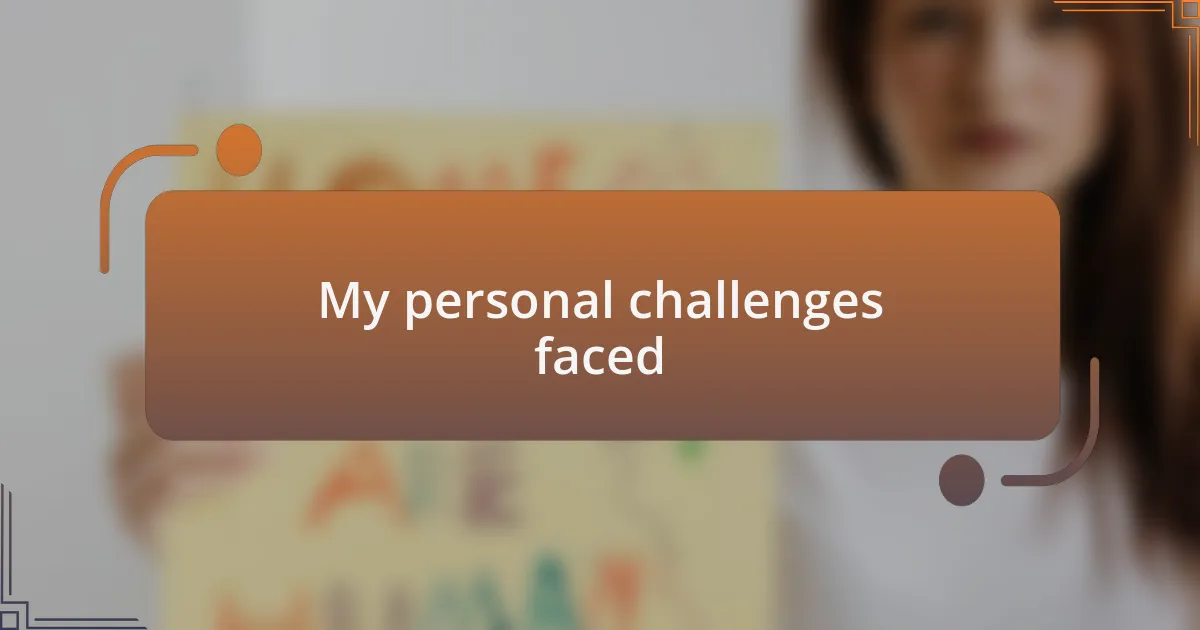
My personal challenges faced
Organizing the local event brought unexpected hurdles that tested my resolve. One of the most challenging moments arose when a key speaker canceled at the last minute. I felt a wave of panic wash over me. How would we maintain the momentum and enthusiasm we had built? It was a hard lesson in adaptability as I scrambled to find a replacement, reminding myself that flexibility is crucial in event planning.
Another significant challenge was managing the diverse opinions within our advocacy group. While collaboration is essential, I found that differing perspectives sometimes led to misunderstandings. I recall a heated discussion about our messaging strategy, which left me feeling frustrated and drained. It made me realize the importance of clear communication and finding common ground, even when emotions run high.
Lastly, I faced personal doubts regarding my leadership capabilities. Organizing an event of this scale was daunting, and at times I questioned whether I was capable of bringing our vision to life. I remember standing in an empty venue before the event started, filled with anxiety about turnout. It taught me that vulnerability is part of leadership, and embracing it can foster stronger connections within the team. How often do we allow self-doubt to shadow our potential?

Lessons learned from my experience
One of the most profound lessons I learned was the value of building a strong network before an event. Initially, I thought I could rely solely on my immediate circle, but I quickly realized that reaching out to a broader community of supporters was essential. For example, a last-minute partnership with a local organization not only filled that unexpected speaker gap but also brought an energy and enthusiasm that I hadn’t anticipated. Have you ever underestimated the collective power of community support?
I also discovered the significance of thorough contingency planning. I often counted on everything to go smoothly, but when technical issues arose during the event, I felt the weight of that oversight. Watching the audience’s reaction shift from anticipation to confusion was gut-wrenching. That incident taught me that having backup plans in place isn’t just smart—it’s necessary to maintain the event’s flow and energy. How often do we overlook the basics in favor of optimism?
Moreover, I learned that the emotional connection with attendees is paramount. When I took a moment to share my own journey and struggles, I could see the audience resonate with my experiences. It was a pivotal moment that transformed the atmosphere, making it personal rather than just a presentation of facts and statistics. This interaction reminded me that storytelling is a powerful tool in advocacy. How often do we remember that people connect through shared experiences rather than abstract ideals?